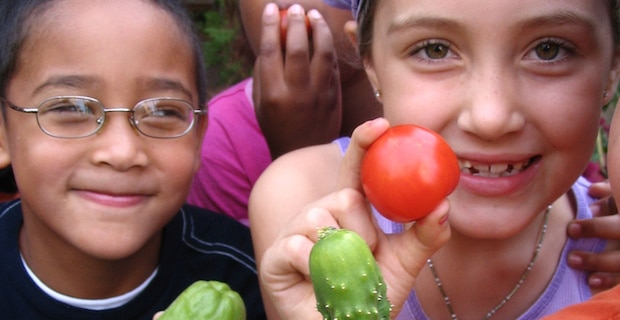
Most kids today don’t know that the bananas they eat daily are imported from tropical countries or that the strawberries they see in their cereal in the winter may have had to travel hundreds or even thousands of miles. Kids today don’t know this because supermarkets carry all foods imaginable all year round and quite normally it's assumed that this abundant supply is natural and permanent.
This misguided thinking brings with it several hidden costs to us all, most particularly in the area of environmental damage, but not exclusively. Most of us aren’t aware of these other costs because all we’re aware of is the advantage of having anything we want at any time we want. Eating with the seasons, however, can provide many benefits that families can enjoy and feel good about in addition to helping to shape kids into environmentally responsible citizens.
Probably the biggest and most widely publicized benefit of eating seasonally is the reduction in the environmental impact caused from the transport of foods. When we eat in season and hopefully locally, this means that the food we are eating does not need to travel nearly as far as it typically does. This means fewer fuels are consumed and less pollution is created.
Read more about air pollution and autism risk
Without an awareness of where our food comes from and the impact it makes on our environmental and therefore physical health, our children’s generation may continue to make the same mistakes older generations initiated that have had devastating affects on our earth. As an exercise you may want to explore labels in grocery stores listing places of origin for imported foods and once at home bring out a map to clearly show how far these foods needed to travel.
Another significant benefit of eating seasonally is that food moves from farm to table fairly quickly allowing for minimal freshness to be lost. This also allows for the flavor of food to be enhanced as freshness and taste are closely linked. To help root this experience ask your kids to try and sense if they can taste the distinction in foods that are in season to help them internalize the difference.
By eating seasonally and locally we are also able to help support local farmers and economies. For many communities this is an important element that helps keep their citizens connected and employed as rather than sending money out of the region, dollars are circulated internally. To make this point clear, take your children to farmer’s markets or better still, local farms, and allow them to meet and get to know the people and practices you are supporting through your purchases.
Choosing to buy seasonal and local foods can also have positive consequences on your food budget. By buying foods that are more readily available at the appropriate time of year we can minimize the extra costs that are associated with importing.
Seasonal eating can also serve the purpose of encouraging more variety in our diets. When we recognize that berries or corn are out of season, it encourages us to consider what other foods may be available, thus creating a rotation in the foods that we eat. We may still have the occasional strawberry during the off season but we learn to enjoy foods more when they are abundantly available in their proper season.
Read more about fruits and veggies to plant with kids
So what’s in season for fall? Well that all depends on where you live. But certain websites such as Epicurious feature maps of local harvests for each state and the corresponding month of the year.
The good news is that the simple choices we can start to make as families now can have huge repercussions on the well being of our bodies, communities and environment in the very near future.
Image: michel bish










